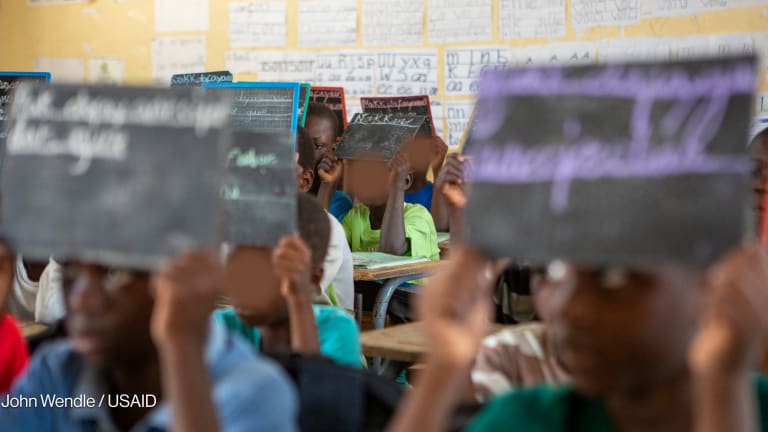
KATHMANDU, Nepal — In Haiti, where the majority of children lack access to quality education, one NGO is trying a different model.
Anseye Pou Ayiti, which means “teach for Haiti” in Creole, is adapting the tried-and-tested Teach For All model — which typically places local university graduates into struggling schools for a two-year teaching fellowship — by opening it up to local teachers and high-school graduates. It is part of an effort to improve learning outcomes and help students reclaim their cultural heritage.
Founded five years ago, Anseye Pou Ayiti is a member of Teach For All, a global network of 48 education nonprofit organizations seeking to improve failing education systems by recruiting talented education leaders.
The model was first launched in 1990 as Teach For America. It proved so successful that other countries soon adopted the model and in 2007, these groups were brought together under the Teach For All network.
However, critics say the model is elitist and devalues the teaching profession by presenting it as something untrained graduates can do for two years before moving on to other careers. The United Kingdom Teach For All affiliate was recently criticized for unintentionally underscoring this message in a tweet about a fellow who went on to found an investment banking consultancy.
Others have characterized Teach For All as exporting a homogenized Western education model.
Teach For All looks beyond the classroom with new community lab
The organization has launched the Community Impact Lab to understand the connection between what happens outside the classroom and the learning within it.
But Wendy Kopp, who founded Teach For America and now runs the global network, claims many of the criticisms are misplaced, reflecting an “ideological warfare” within the education sector. Speaking to Devex at the group’s annual conference in Nepal, Kopp was keen to emphasize that the Teach For All model is rooted in communities as demonstrated by their new Community Impact Lab, which seeks to help partner organizations prioritize learning across whole communities, not just in classrooms.
Anseye Pou Ayiti’s chief executive Nedgine Paul agreed, pointing to the group’s local take on the model in Haiti. She said that while it provoked “contentious conversations” over changing the entry requirements from university graduates to high-school graduates, which some feared could lower the bar, the fact Anseye Pou Ayiti was ultimately accepted into the Teach For All network proves its value.
“With Teach For All you see independent organizations coming together. It’s not a franchise model — we have done things differently and there is space for it,” Paul said, adding that conversations with other members helped improve Anseye Pou Ayiti’s approach. Teach For Armenia has now followed and is also recruiting current teachers in addition to people from outside the sector.
Anseye Pou Ayiti follows the same two-year fellowship model as its sister Teach For All organizations and operates in 66 rural primary schools with 85 current fellows — 80 percent of whom were recruited from local communities — and 75 alumni. It works mostly in private schools since only 10 percent of Haiti’s schools are run by the government, Paul said.
The decision to accept nongraduates and current teachers onto the program was in part borne out of necessity, since “we would be replicating injustice to say that 99 percent of our [local] people are not eligible,” Paul explained. But recruiting locally was also central to Anseye Pou Ayiti’s mission to build a “movement of civic leaders,” which means rebuilding community ties and helping students, teachers, and parents rediscover their Haitian cultural heritage. That has included introducing pedagogical approaches that emphasize Creole, refer to Haitian proverbs, and “tailor lessons to contextualized realities of our kids,” she said.
Kopp told Devex she welcomed Anseye Pou Ayiti’s innovations on the model and that they demonstrate the network’s job of helping partners learn from each other.
“We have our unifying principles but at [the] same time we are banking on the fact people will adapt [the model] to their context and innovate around them,” Kopp said. “We now have 48 teams experimenting with different criteria and tools for screening candidates …[and] figuring out selection systems that are not biased to people that come from nontraditional backgrounds.”
While a degree is a legal requirement for teaching in some countries, such as the U.S., “the degree was never the bar … it’s about asking bigger questions … What is the personal characteristic you can see early on ... that would predict they will be the kind of people [to] have a transformative impact on kids and ultimately education systems?” she said.
Kopp said she expects the network to grow to cover 80 countries within the next eight years, in response “to demand from local leaders.”
However, while Kopp maintains that recruiting a diverse and representative set of fellows has always been central to the Teach For All model, it is something she wishes she had pushed harder on from the beginning.
“I’ve often reflected ... that if I could do one thing differently about Teach For America ... it would be to put an effort to develop [and] co-create contextualized visions for student success at the very center of the work,” she said.
Had she done so, “we would have made so much more progress more quickly … We would have oriented our work all the more purposefully and enabled ... a collective approach with stakeholders and allies in communities.”
Editor’s Note: The reporter traveled to Nepal with the support of Teach For All. Devex retains full editorial control and responsibility for this content.








